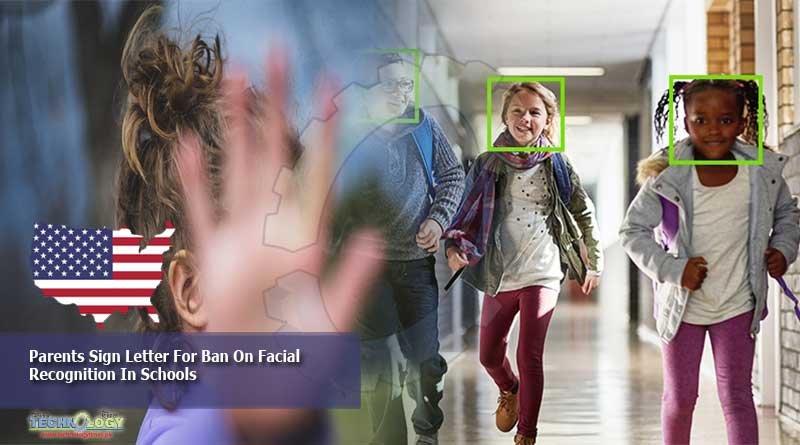A nonprofit advocacy group promoting causes related to privacy, censorship, and copyright legislation, published a letter calling for a ban on facial recognition in U.S. schools

This morning, Fight for the Future, a nonprofit advocacy group promoting causes related to privacy, censorship, and copyright legislation, published a letter calling for a ban on facial recognition in U.S. schools. The open letter, which is addressed to lawmakers and school administrators around the country, has gained 1,000 signatures from parents in 50 states in less than a week. It highlights the dangers of surveillance and risks associated with data compromise, as well as ways facial recognition might exacerbate discrimination against specific groups of students.
Fight for the Future’s campaign comes as an increasing number of schools consider deploying facial recognition tech to combat the coronavirus pandemic. Fayette County Public Schools in Georgia recently purchased cameras made by Hikvision, a Chinese provider of facial recognition tools and surveillance equipment, to estimate students’ temperatures as they walk in the door. The Topeka Public School District acquired screening systems that ship with integrated facial recognition features. And in New Hampshire, the Rio Rancho Public Schools Board of Education ordered dozens of GoSafe tablets that have built-in facial recognition components.
Elementary and high school students aren’t the only ones being subjected to facial recognition. The University of Texas partnered with startup Clear to bring scanning to its football stadium, following the University of California, Los Angeles’ proposal to use facial recognition for campus security surveillance. USC Annenberg requires students in some dorms to use facial recognition to gain access to their rooms. And in New York, Molloy College is reportedly using kiosks with both thermal and facial recognition capabilities to authenticate students’ identities and track their health.
Countless studies have shown that facial recognition is susceptible to bias. A paper last fall by University of Colorado, Boulder researchers demonstrated that AI from Amazon, Clarifai, Microsoft, and others maintained accuracy rates above 95% for cisgender men and women but misidentified trans men as women 38% of the time. Independent benchmarks of major vendors’ systems by the Gender Shades project and the National Institute of Standards and Technology (NIST) demonstrate that facial recognition technology exhibits racial and gender bias and suggest facial recognition programs can be wildly inaccurate, misclassifying people upwards of 96% of the time.
Experts argue facial recognition in schools could take existing biases and make them worse, causing more surveillance and humiliation of Black and Latinx students. Moreover, they say it could make surveillance a part of everyday life, laying the groundwork for expansion to other uses.
“Momentum is growing to ban facial recognition for good, but we know that companies are specifically targeting schools, which is why we need to ban it now,” Fight for the Future campaign director Caitlin Seeley George said in a statement. “These tech companies care more about making money than how much their product will hurt children. We’ve already seen how facial recognition has endangered adults — we can’t let this happen to our kids.”
A recent study published by University of Michigan researchers showed facial recognition technology in schools has limited efficacy and presents a number of potential privacy problems. For instance, the coauthors write that facial recognition would promote new codes for dress and appearance and punish students who don’t adhere to those constraints, as well as causing problems for schools that rely on the technology for attendance-taking, lunch sales, and other daily activities. They also assert that facial recognition will create new kinds of data that can be purchased by private corporations, making it impossible for students to provide full and informed consent for data collection or control.
A report released this month by the Surveillance Technology Oversight Project says any technologies adopted during pandemic school reopenings should take into account potential data hacking and other unforeseen uses of data, as well as students’ right to privacy protections from administrators, police, and even their parents. “In addition to suffering from well-documented racial and gender biases, many facial recognition systems have been shown to be less accurate for children and teenagers,” the report reads. “Similarly, wide-area thermal scanning suffers serious limitations around reliability and potential bias. Taking temperature readings from a distance has not been found to be an accurate way to diagnose the presence of a fever, let alone COVID-19, and error rates may differ along racial and gender lines.”
The message appears to be resonating with some lawmakers, albeit only at the state level. In July, New York passed a moratorium on the use of facial recognition and other forms of biometric identification in schools until 2022. The bill, a response to the Lockport City School District launching a facial recognition system, was among the first in the nation to explicitly regulate or ban use of the technology in schools.
The article is originally published at Venture beat
